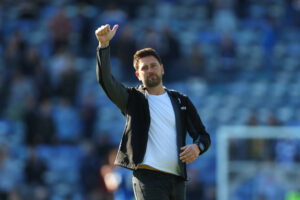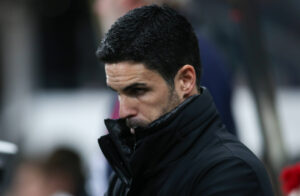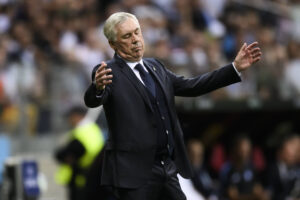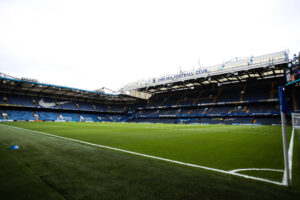If he is not the greatest writer of the 20th century, Argentina’s Jorge Luis Borges may just be the most innovative. No-one before or since Borges has written the kind of fantastical, elliptical short stories and essays about imaginary cities and libraries the size of cities that he did. And yet for all his undoubted literary greatness, Borges is probably best known for a phrase that he coined about the Falklands War; namely that it was “two bald men fighting over a comb”.
This week I was reminded of that marvellous description of pointlessness when I watched Anderlecht play Celtic in the Champions League group stage. Although Bayern Munich’s capitulation against PSG and the subsequent sacking of Carlo Ancelotti has theoretically opened up the battle for second place in the group behind PSG. In reality though, both the Scottish champions and the Belgian champions are engaged in a tussle for third place, so that they can qualify to play in the Europa League after Christmas.
And what pray, is the great prize on offer for winning the Europa League? Why, a place in the Champions League next season, which both teams are likely to secure anyway through their domestic league competition. Europa League football would only prolong the vicious circle of qualifying for a tournament that they have no chance of winning.
Of course Celtic ultimately won the match in Brussels this week 3-0, which was just the latest in a long line of humiliations for Anderlecht. It was only Celtic’s second ever away win in the Champions League and the first that they had achieved without conceding a goal. It seems to say everything about the current European footballing status of Belgium’s biggest and most successful club. Essentially, that status is now the status of minnows, and minnows who no longer just lose to European football’s great white sharks (Real Madrid, Barcelona, Bayern and possibly PSG) but to less prestigious teams too.
It was not always thus. Indeed, for two brief but glorious periods in the 1970s and 1980s Anderlecht not only consistently won the Belgian league (as they have done an astonishing 34 times since the end of World War Two) but competed for and won European trophies.
The first of those periods was in the mid-1970s. Belgian football as a whole had only fully emerged on the international scene in 1972. That was when Belgium hosted the final stages of the European Championships and only lost out in the semi-final to the great West Germany side that went on to win the tournament. Four years later, Anderlecht showed that Belgian clubs could match, or even improve upon, the record of the national team when they reached their first major European final, the Cup-Winners’ Cup final.
That Anderlecht side combined home-grown talent, such as the superb attacking midfielders François Van der Elst and Frank Vercauteren, with some foreign stars, notably the great Dutch attacking duo of Rob Rensenbrink and Arie Haan. Rensenbrink and Van der Elst scored two goals apiece as Anderlecht won 4-2 against West Ham, who themselves contained such great players as Trevor Brooking and Billy Bonds.
That first European trophy was won on home soil, as the 1976 final had been played in the Heysel stadium in Brussels. That stadium would become infamous the world over in 1985, when its crumbling terraces contributed to the deaths of 39 Juventus fans during that year’s European Cup final with Liverpool. Consequently, Anderlecht’s second European success in 1978 (again in the Cup-Winners’ Cup) was even more impressive than their first. This was because it was achieved in a neutral venue in Paris and culminated in a 4-0 thrashing of Austria Vienna. Once again, Rensenbrink got two goals, making him the standout player in a fine all-round team performance.
Five years later, Anderlecht would win their third and so far final European trophy, when they beat Benfica 2-1 on aggregate (in a two-legged final) to win the UEFA Cup. By this time, Vercauteren was the captain of the team and although Rensenbrink had left there was another authentic foreign star in the great Danish sweeper, Morten Olsen. Olsen was even more impressive the following year, when he provided probably the finest attacking displays by a so-called defender since Franz Beckenbauer a decade earlier. On that occasion, however, they lost on penalties to Tottenham Hotspur. Decades later it emerged that they had only reached the 1984 final after club officials had bribed their semi-final referee to ensure victory over Brian Clough’s Nottingham Forest. (Clough, ever suspicious of the tactics of foreign clubs and their officials, had long maintained that that semi-final had been “fixed” and he was ultimately proved right.)
On the European stage, Anderlecht have never truly recovered from the pain of that defeat and the shame of that bribery scandal. Although they have continued to win Belgian league titles, they have never come close to making another European final and, as the game against Celtic proved, it now looks as if they will never reach another European final again.
In that respect, Anderlecht are certainly not alone, as European football is full of former giants – big clubs from small countries that may have won European competitions in the past but are highly unlikely to do so ever again. That is because so much of European football’s wealth (both in terms of money and talent) is concentrated in the big five leagues of England, Spain, Germany, Italy and France. Of course, Celtic themselves are another prime example of a former giant, as are the likes of Ajax, Feyenoord, Benfica and Porto.
It is entirely possible that these former greats will never win another European trophy (never mind the Champions League – they may not even win another Europa League), and that is because they are whales trapped in fishbowls. Effectively, they are too big for their own domestic league but not quite big enough (especially in financial terms) to compete with clubs from the big five European leagues, to whom they invariably lose their best players.
The only possible solution to this problem is not likely to come any time soon. A solution may yet emerge in the eventual possible reorganisation of European football in preparation for a European league. Just as Celtic and their own great domestic rivals, Rangers, long to be allowed to compete in England in the hope of ultimately sharing in the Premier League’s TV riches, so clubs such as Anderlecht, Ajax or Feyenoord could benefit from being allowed to join the French league.
All of this is a long way off, if it ever happens at all. For the time being, the fallen greats of European football, such as Anderlecht, must continue on the apparently interminable treadmill of qualifying for the Champions League, being routinely thrashed in it, and then trying to qualify for the following season’s Champions League. And while that unappealing status quo continues, Anderlecht will remain just one more bald man fighting it out with all the other bald men for the use of a single comb.
Main Photo
Embed from Getty Images






